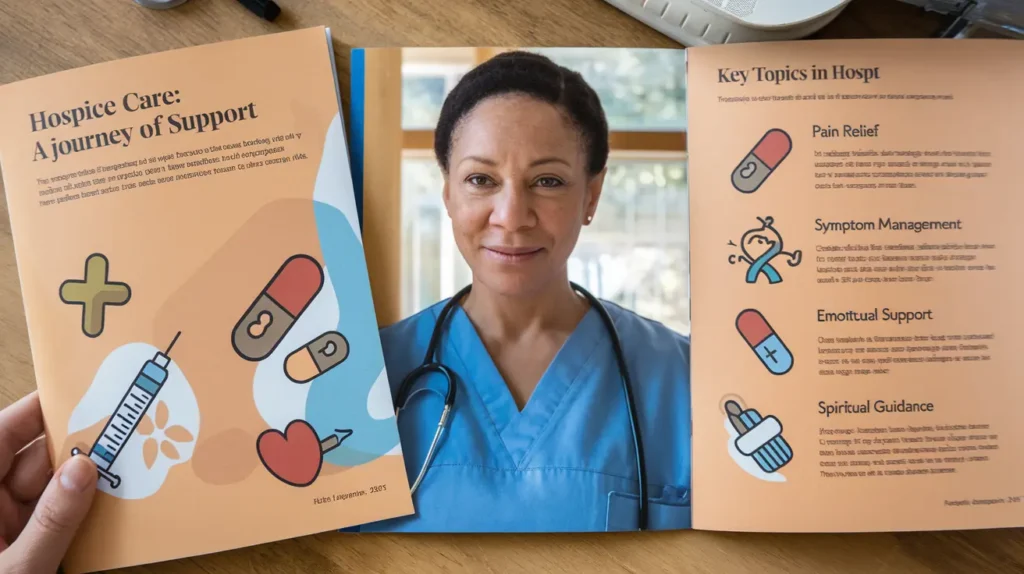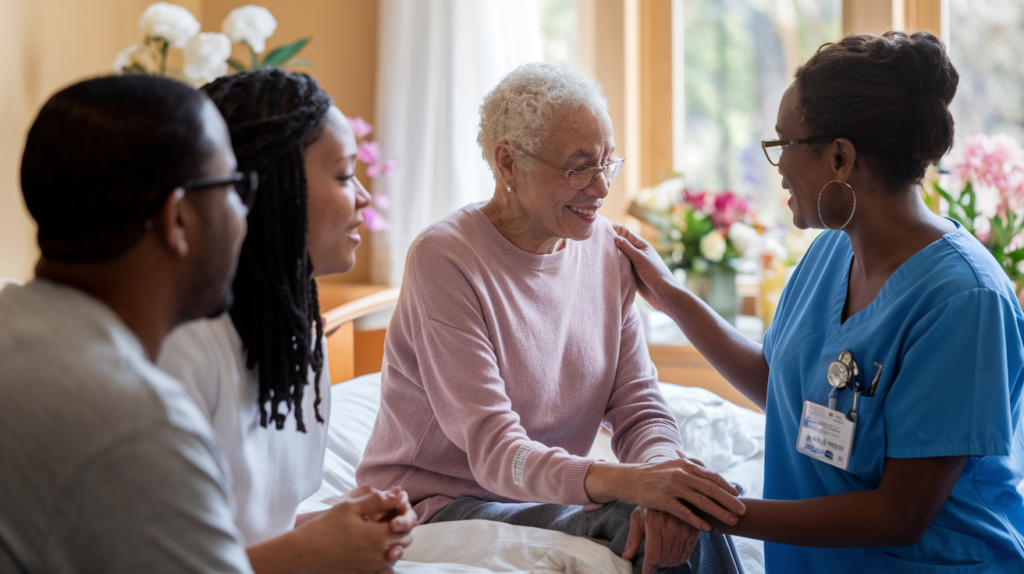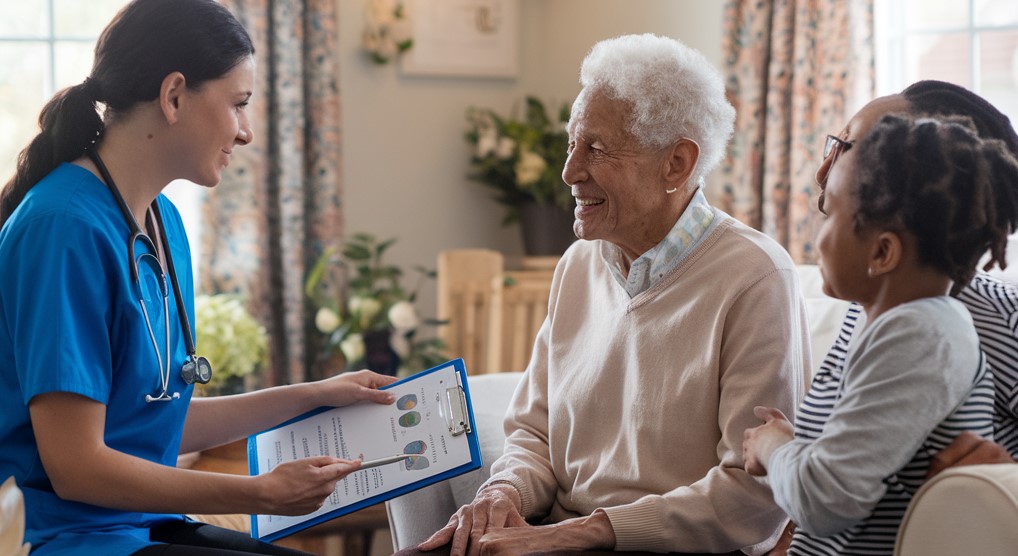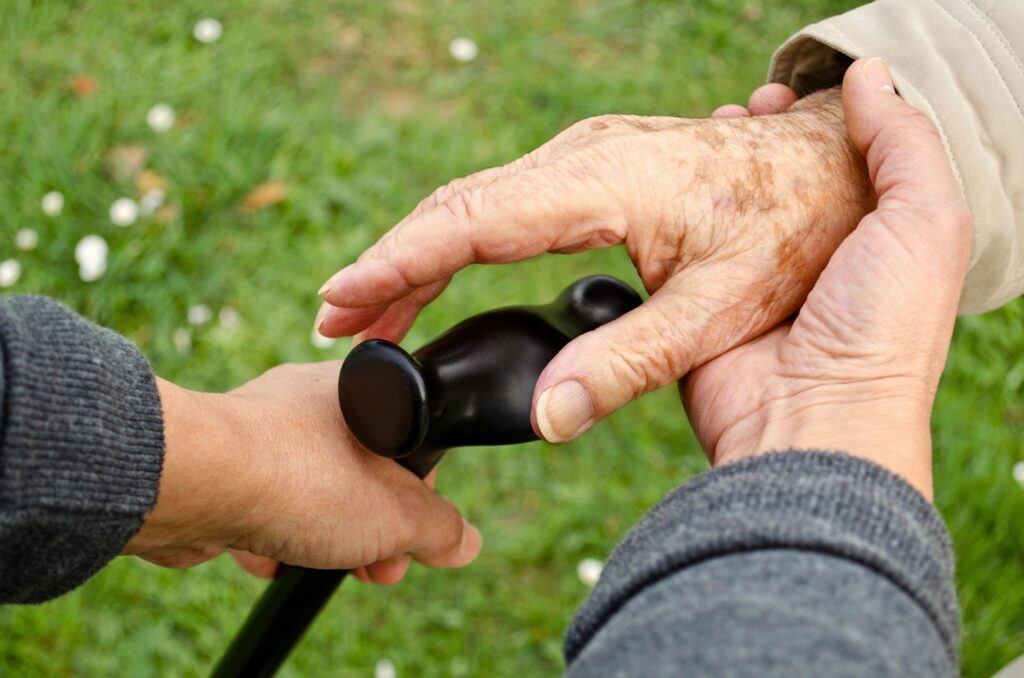Hospice nurses play a big part in helping patients and their families understand what to expect during end-of-life care. They offer kindness, support, and clear information to make things easier for everyone. This blog explains the important things a hospice nurse teaches families so they can feel ready and confident while caring for their loved one.
The Nurse’s Role in Hospice Education
Hospice nurses have many jobs. They share information, answer questions, and support families emotionally. They make sure everyone understands the care plan and feels prepared. By being kind and patient, nurses help families feel less scared. They make it easier for families to focus on spending meaningful time with their loved one.
Key Topics Covered in Hospice Education
Pain and Symptom Management
Families often worry about keeping their loved one comfortable. Nurses teach them how to manage pain, breathing issues, and other symptoms like nausea or tiredness. They show how to give medications and use simple techniques like helping someone sit up or relax. Nurses also remind families that help is always available, even in the middle of the night. They explain how to balance medicine to make the patient feel better while keeping them alert and comfortable.
Understanding the Care Plan
Every hospice care plan is unique. Nurses explain how the plan is created and how it can change as the patient’s needs change. They talk about how the team including doctors, social workers, and chaplains works together to care for the patient’s body, emotions, and spirit. This helps families feel included and confident that their loved one is getting the best care.
End-of-Life Signs and Comfort Measures
Knowing what to expect as the end of life gets closer can help families feel more at peace. Nurses explain common signs like changes in breathing, eating less, or sleeping more. They show families how to comfort their loved one with soft touches, kind words, and a calm environment. Understanding these changes can help families feel prepared and focus on creating a peaceful, loving atmosphere.

Teaching Family Members About Caregiving
Practical Skills
Nurses teach families how to help with everyday tasks like bathing, feeding, and moving their loved one. They also show how to give medicines and look for signs of pain or discomfort. Through hands-on demonstrations, nurses make sure families feel confident. They also offer tips to prevent problems like bedsores or help with challenges like limited mobility.
Emotional Preparedness
Taking care of a loved one can be emotionally hard. Nurses help families manage their feelings and share ways to cope, like breathing exercises or joining a support group. They remind caregivers to take care of themselves, too, because they need to stay strong. Nurses also talk openly about what’s coming, helping families feel ready to say goodbye when the time comes.
Support Networks
Nurses encourage families to ask for help and involve others in caregiving. They introduce the hospice team and connect families with local resources like support groups or counseling. By building a strong support network, families feel less alone and more capable of handling the caregiving journey.
Addressing Common Concerns and Questions
Misconceptions About Hospice
Some people think choosing hospice means giving up. Nurses explain that hospice is about comfort, dignity, and making the most of the time left. They share how hospice care can create special moments of peace and connection. By clearing up misunderstandings, nurses help families see hospice as a source of support.

Navigating Cultural or Personal Beliefs
Every family has its own beliefs about end-of-life care. Nurses respect these beliefs and work to include cultural or spiritual practices in the care plan. By honoring these traditions, nurses make sure families feel supported and respected while providing the best care possible.
Dealing With Uncertainty
End-of-life care can feel confusing and full of tough decisions. Nurses guide families through options like advance care planning and help them understand what their loved one wants. By encouraging open conversations, nurses help families feel more certain and less stressed.
Emotional and Psychological Support
Caring for someone at the end of life is about more than physical care. Nurses help families deal with emotions like sadness, anger, or guilt. They encourage sharing memories, talking openly, and creating special moments. If needed, they recommend counseling or support groups. By addressing these emotional needs, nurses help families feel more at peace.
Resources Provided by Nurses
Educational Materials
Nurses give families helpful guides and handouts on topics like caregiving tips and symptom management. They also suggest books or websites for more information. These materials give families something to refer to when they need extra support.
Access to the Hospice Team
Families learn how to reach the hospice team anytime they have questions or concerns. Nurses reassure them that no problem is too small and that help is always nearby. This support helps families feel secure and ready for anything.
Community Resources
Nurses connect families with local programs like respite care, financial help, or spiritual support. These resources can make caregiving easier and help families feel more connected and less overwhelmed.
Case Studies or Scenarios
Scenario 1: A Family Overwhelmed by Caregiving Responsibilities
The Alvee family was struggling to take care of their loved one while managing their own lives. The hospice nurse showed them how to give medicine and do daily tasks, and connected them with a support group. By involving more family members, the nurse helped lighten their load and made it easier for them to focus on spending quality time together.
Scenario 2: A Patient Experiencing Complex Symptoms
Mr. Khairul was in pain and having trouble breathing. The hospice nurse taught his family how to help him feel better with medicine, sitting him up, and using relaxation techniques. By explaining the care plan clearly, the nurse gave the family the confidence to care for him at home, keeping him comfortable and maintaining his dignity.
Verdict
Hospice nurses are key to helping families understand and manage end-of-life care. With kindness and clear guidance, they make a difficult time easier. By teaching practical skills, offering emotional support, and building trust, nurses help families provide the best care for their loved ones, filling their final days with comfort and love.
References and Resources
- National Hospice and Palliative Care Organization (NHPCO): https://www.nhpco.org
- Hospice Foundation of America: https://hospicefoundation.org
- Caregiver Action Network: https://www.caregiveraction.org
- Mayo Clinic – Hospice Care: https://www.mayoclinic.org
- American Academy of Hospice and Palliative Medicine (AAHPM): https://aahpm.org






